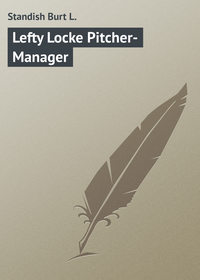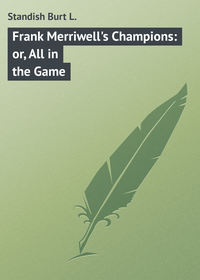 полная версия
полная версияDick Merriwell's Pranks: or, Lively Times in the Orient
“What happened to them?”
Mustapha made a gesture with his hands indicative of vanishing into the air.
“Who answer it the question?” he said.
“Well, well!” muttered Zenas. “What do you think about this matter, boys?”
“My interest is aroused now,” answered Dick. “I want to see this mysterious place.”
“That’s right, pard. I’m sure some wrought up to see it myself. Of course we’ll go.”
“Too young to haf wisdom,” said Mustapha, with a gesture toward the boys.
“Come on, professor!” cried Dick. “If this dragoman will not act as guide for us, we can easily secure another.”
Instantly Mustapha hastened to assure them that he would be only too glad to act as their guide; but that they should pay him before visiting the Underground Palace, as they might never return, in which case he would lose his honestly earned due by neglecting to collect ahead.
They agreed to pay him in advance, and soon they set out from the hotel in Pera, eager to see the mysterious place that was said to hold so much of mystery and danger.
In the afternoon sunshine Stamboul was magnificent when seen from a distance. But when they had crossed the Golden Horn and plunged into the city all its impressiveness vanished. At intervals they came upon some splendid mosques, but mosques were far more impressive when seen from the proper distance.
Mustapha knew his business, and he conducted them to the place where they could descend and inspect the Underground Palace, but he declined to enter with them. For that purpose he called another man, with close-set, shifty eyes and a thin-lipped mouth.
“This dragoman, Bayazid,” he said. “He tak’ you.”
“Is he trustworthy?” asked the professor, with a slight show of nervousness.
“You not find one more so, effendi.”
So Bayazid, or “Pigeon,” as he was called in English, was engaged to show them the Underground Palace.
“I haf very good boat, effendi,” he declared.
“Whatever is that?” asked Buckhart. “Do we have to take a boat?”
“You will see,” answered Zenas.
The entrance was somewhat like that of a sewer, but there were stone steps leading down into the darkness of the place. The guide found and lighted two torches, which it seemed were kept for the use of those who wished to visit the Palace.
“Say, this is some boogerish!” said Brad, as they found themselves in a dark and damp cemented passage.
“The old city was built above a huge system of cisterns,” explained the professor. “Their purpose was to guard against a famine of water in time of war. Some of the old cisterns are dry now and are used by silk spinners. We shall visit one that still contains water.”
“But I thought we were going to see a palace,” said Dick, in disappointment.
“You shall see one – so called.”
The passage echoed to their tread, while their voices came back hollowly, as if hidden imps were mocking them.
But the boys were quite unprepared for the spectacle that suddenly met their gaze. They came from the passage into a mighty vaulted chamber, stretching away into an unknown distance and filled with a shadowy maze of marble columns, row on row. The floor of this wonderful place was smooth as a mirror and seemed black as ebony, save where the light of the torches fell on it. There it glittered, and gleamed, and shimmered.
Exclamations of astonishment and wonder broke from the lips of the two lads. The professor grasped them, one with either hand, and stopped them abruptly.
“We can’t go farther on foot,” he said.
“Eh? Why not?” asked the Texan, in surprise. “Look at that floor! Wouldn’t it be great to dance on! It’s smooth as glass and – ”
“You would get your feet wet if you attempted to dance on that,” declared Zenas.
“What? Why – why, it’s water!”
“Exactly.”
“But – but it looks black everywhere except where the light strikes directly on it.”
“Because no other ray of light reaches this place.”
Dick stooped and dipped his hand in the water, which reached to their very feet.
“Well, this is worth seeing!” he declared.
“This was constructed by Constantine more than fifteen hundred years ago,” explained the professor. “Think, boys, what you now behold is the work of man, yet it remains practically the same as when constructed fifteen centuries ago.”
“It looks like a partly submerged cathedral,” murmured Dick. “One can fancy all its worshipers and priests as drowned in that flood of black water. In fancy I seem to see their restless spirits floating above the surface of the lake, away, away yonder in the unknown distance. How large is it, professor?”
“There are three hundred and thirty-six of those marble columns, arranged in twenty-eight rows. I fancy the real reason why Mustapha refused to enter here is because of the many legends and tales told concerning the place. It is said that these vaults often echo to hollow laughter, and that the place is haunted by the ghosts of murdered sultans of past ages, whose places were usurped by the very monsters who intrigued to bring about the murders. Some claim that the spirits of the beautiful women destroyed by jealous sultans are doomed to float forever here above the surface of this buried lake, and that occasionally one of them is seen by a visitor for a single fleeting instant, then goes wailing and sobbing into the black distance.”
“Well, by the great horn spoon, I don’t know that I blame Mustapha for not coming here!” exclaimed Brad. “It’s the most spooky old hole I ever struck.”
At this juncture Bayazid inquired if they wished to take a boat and venture out a short distance on the water.
“Certainly,” answered Dick, at once. “I think it will be a novel experience, and I want to go. If Brad does not – ”
“Hold on, pard!” cried the Texan. “Wherever you go I go, you bet your boots! Mebbe I don’t like it a heap, but I’m with you.”
Bayazid left them and moved a short distance to the right. They watched him and saw the light of his torch fall on a black boat that lay motionless at the edge of the black lake. He stepped into the boat and soon brought it to the shore at their feet.
Dick and Brad followed the professor into the boat, which was large enough to accommodate two more persons, if the party had included them.
Bayazid had placed his torch in a socket that seemed arranged for it. He suggested that the others should extinguish theirs, as too much light close at hand would blind them, instead of making it possible for them to see better.
They accepted his suggestion, and slowly the boat slipped out upon the bosom of the soundless lake.
Suddenly there was a whirring rush through the air, and something brushed past the head of the professor, who uttered a squawk of alarm, struck out wildly with both hands and fell over backward off his seat to flounder in the bottom of the boat.
“Howling tornadoes!” gasped Buckhart. “Whatever was that?”
“A bat, effendi,” answered Bayazid.
Dick laughed.
“Goodness!” palpitated the professor, as he finally struggled up to his seat. “I confess it did frighten me, boys. Made me think of those restless ghosts which are said to wander forever above the bosom of this lake. Hadn’t we better go back?”
“Which way shall we go?” asked Dick.
They looked around. On every hand they saw nothing but marble pillars, shadows, and grim darkness.
“Waugh!” muttered the Texan. “I confess I couldn’t follow the back trail.”
“But Bayazid knows the way, don’t you, Bayazid?” anxiously asked the professor.
“I know it, effendi,” was the assurance. “Trust me.”
“I – I’m very glad you do!” breathed Zenas. “I think we will return at once.”
But Dick urged that they should go on a little farther, as Bayazid was thoroughly familiar with the place and there was no danger that they would become lost.
Brad always stuck by Dick, and the two overruled the old pedagogue.
Therefore Bayazid paddled slowly on. Had they seen his face they might have become suspicious and alarmed, but the shadows hid the crafty and treacherous look his countenance wore.
Finally they paused again, amid the labyrinth of pillars. Without the guide, not one of them could have told which course to follow in order to return to the point from which they started.
Suddenly Bayazid uttered an exclamation and stood up in the boat, staring into the darkness beyond his passengers.
Involuntarily the trio turned their heads to look, wondering what it could be that the guide saw.
Barely were their heads turned in that manner when the treacherous guide snatched the torch from its socket and plunged it into the water. There was a hissing sound and instant darkness.
CHAPTER VII – LOST ON THE BURIED LAKE
Dick Merriwell had brought along a revolver. He drew it in a moment and held it ready for use, expecting something to happen in the Stygian darkness of that terrible place.
Professor Gunn cried out to Bayazid, demanding to know the meaning of his act.
“Get hold of the onery varmint!” advised Buckhart. “Let me put my paws on him!”
The Texan floundered about, rocking the boat somewhat.
“Be careful, Brad!” warned Dick. “You don’t know what he will do! It may be intended for a joke, just to frighten us, and it may be intended for something else. I have a pistol. Keep away from him and let me do the business.”
“Pup-pup-perhaps it’s pup-pup-part of the regular pup-pup-programme,” chattered Professor Gunn. “Pup-pup-perhaps they always pup-pup-put out the tut-tut-torch when they have pup-pup-passengers on this old underground pup-pup-pond.”
“Be quiet,” directed Dick. “Bayazid.”
He called to the guide, but there was no answer.
“Bayazid!”
Again he called. His voice echoed hollowly in the unseen arches above their heads.
“Why doesn’t the blame fool answer?” growled Buckhart.
“Strike a match, Brad,” directed Dick. “I’m holding my revolver ready for use, and I’ll shoot, if necessary, the moment I can see what to shoot at.”
The Texan lost little time in producing a match, but when he attempted to strike it he failed, the brimstone breaking off. Three matches were used before one burned. The light flared up, Buckhart holding it above his head. Its glow fell on the old professor and the two boys, and simultaneously they made an amazing discovery.
They were alone in the boat!
Bayazid, the guide, had disappeared!
Dick had his revolver ready for action, and he was standing in a half-crouching position, peering over the head of Buckhart at the place in the boat lately occupied by the guide.
“He’s gug-gone!” gasped Zenas.
Brad dropped the match, and again they were buried in darkness which seemed to oppress them like an awful weight.
“Great catamounts!” said a voice that sounded strange and husky, but which Dick recognized as that of the Texan. “Where has he gone? What does it mean, partner?”
“It means that we are the victims of trickery of some sort,” answered Dick, speaking in a low tone.
“It means that we are deserted to perish on the bosom of this awful buried lake!” came from the professor, in something like a moan. “I am to blame! I brought you here!”
“But whatever could be the object?” questioned Brad, in a puzzled tone. “If it’s robbery – ”
“It’s a plot – a plot, boys! We are objects of suspicion. That agent of the secret police suspected us of something. In this awful city to be suspected is to be doomed.”
“I can’t realize it yet,” muttered Dick. “How could the guide get out of the boat?”
“I’ll strike another match, pard,” said the Texan. “Keep your gun ready for use.”
“There are other torches,” reminded Dick. “We placed them in the bottom of the boat. Find them, Brad, and light one.”
During the interval that followed the Texan was heard feeling about the bottom of the boat. After a time he confessed:
“I can’t seem to get my paws on them. I’ll have to use another match. The light will show us where they are.”
Another match was lighted, but, though it was held and moved about to illumine the bottom of the boat, not a torch was discovered. When they realized that the extinguished torches were gone they sat up and looked into one another’s eyes by the last gleams of the exhausted match, which Buckhart held until the blaze scorched his fingers.
For some moments silence followed.
Floating there on the motionless bosom of that black lake, no sound came down to them from the great city overhead. The stillness was appalling, yet all feared to speak, dreading the sound of their own voices.
Finally Dick asked:
“How many matches have you, Brad?”
“Not over four or five more.”
“And I have none. How about you, professor – have you any?”
“Not one,” was the despairing answer.
Suddenly Buckhart grated:
“I’d like to get my paws on the treacherous dog who deserted us in this fix! I’d certain fit him for a funeral! You hear me affirm!”
“I’m still unable to account for his action,” said Dick. “If his object is robbery, surely he has taken a strange way to go about it.”
“Perhaps he’s counting on frightening us good and plenty,” observed Brad. “Mebbe when he thinks we’re so frightened that we’ll be glad to cough up liberal he will appear and offer to conduct us back to the outer world.”
“Let’s call to him,” eagerly suggested the professor. Then he lifted his voice and called loudly.
When he had repeated the cry three times, they listened.
“Didn’t you hear a distant answer?” asked Dick.
“I judge whatever we heard was an echo,” said Brad.
After a time they lifted their voices in a united shout, and then listened to the mocking echoes which fled from pillar to pillar and died in the unknown distance.
“No use!” moaned Professor Gunn. “I am satisfied that we are doomed! We’ll never leave this place alive, and our fate will forever remain a mystery!”
“I’m sure that was no echo!” exclaimed Dick, as far away in the darkness they seemed to hear an answer to their repeated shouts. “Be still and let me shout.”
When he had lifted his strong, clear voice all hushed their breathing and listened.
There was a short interval, and then out of the black distance came a faint, far-away answer.
“Some one did shout, pard!” exclaimed the Texan. “It’s a dead-sure thing!”
Excitedly they all joined in the hail that followed. The answer was more distinct.
Dick had found an oar, and he slowly propelled the boat in the direction from which the answering cries seemed to come. Occasionally they bumped against the marble pillars, but these collisions did no damage.
Soon they could hear the answers to their cries and knew they were drawing nearer to the unknown person or persons who were thus responding.
Suddenly a tiny gleam of light showed amid the pillars at some distance.
“Looks like that’s a match, pard,” observed Buckhart. “I reckon I’ll strike one, too.”
He did so, but the other light disappeared even as he held his own above his head. Apparently his match was seen, for the voice of a man reached them, urging them to come in that direction.
By answering call for call they continued to draw nearer to the strangers, for they soon heard enough to satisfy them that at least two persons besides themselves were afloat on the bosom of that buried lake.
“One is a woman!” asserted Dick.
Lifting his voice, he asked:
“Who are you?”
“We are Americans. Who are yo’?”
“We are Americans, too.”
“What are yo’ doing here?”
“We are lost – deserted by our guide.”
“So are we. How many of yo’ are there?”
“Three. How many of you?”
“Two; and somebody shall suffer fo’ this outrage! Somebody shall pay the penalty fo’ it! I’ll have satisfaction as sho’ ’s my name is – ”
“Major Mowbry Fitts, of Natchez, Mississippi,” finished Dick.
“That’s my name, suh! But yo’, suh – why, is it possible that yo’ are – ”
“Professor Zenas Gunn, accompanied by Dick Merriwell and Brad Buckhart. Is Miss Ketchum, of Boston, with you?”
“I am here,” answered the well-known voice of Sarah Ann. “We have passed through a most awful and excruciating experience, the faintest remembrance of which will forever seem like a fearful nightmare. I am glad you have found us, for now you can assist us in getting out of this frightful place.”
“I am sure we would like to do so,” said Dick; “but, unfortunately, like yourselves, we do not know which way to turn. How did you get here?”
The major explained as the two boats bumped together, and floated thus. Like the professor and the boys, he and Miss Ketchum had visited the lake in company with a guide, who had vanished in a mysterious and unaccountable manner. They fancied they had been afloat for days on the bosom of the lake, and they were in a pitiful condition of collapse and fright, although the major had braced up wonderfully for a time.
“This seems to be the usual manner of treating visitors,” said Dick.
“We’ve used our last match,” said the major. “I lighted it a few minutes ago. We had been saving it. I am afraid we will never be able to escape. I have about given up hope.”
“It is the work of that terrible Turk who urged you into the duel with Professor Gunn, major,” said the woman from Boston. “He warned us to leave Constantinople, but we refused to go, and he told us we would disappear mysteriously.”
“Are you speaking of Aziz Achmet?” asked Dick.
“That is what he calls himself.”
“Then you have seen him since the morning of the duel?”
“Seen him!” indignantly exclaimed the major. “We have seen him everywhere, suh. He has followed us and watched us wherever we went. We couldn’t make a move that he wouldn’t turn up. Twice he told us that we must leave the city and the country.”
“I wish now,” confessed Miss Ketchum, “that we had obeyed him. Don’t you, major?”
“Well,” answered the little man, with a touch of reluctance in his voice, “I must confess, madam, that I believe it would have been much better fo’ us if we had obeyed.”
Barely were these words spoken when, in the pall of darkness near by, a voice demanded:
“Are you ready to depart now? Will you depart at once? Do you, one and all, swear by your God that you will lose no time about going?”.
Needless to say, the sound of that voice affected them all much like a sudden clap of thunder on a clear and sunny day. The woman gave a little scream, the major uttered a smothered oath, the professor gasped for breath, while both Dick and Brad sat bolt upright, their nerves tense.
“Answer at once!” commanded the unseen speaker. “It is your only hope of escaping. Among the Armenians we have enough so-called missionaries, and, therefore, the woman from Boston is not wanted. In the other boat are the old man and the boys against whom the secret police have been warned. It will be easy to cause all of you to vanish from the face of the earth; yet if you pledge yourselves to leave Turkey, you shall be spared.”
“I tell you one thing,” spluttered Zenas Gunn eagerly, “I’ve seen all of Turkey I care to see, and I’ll give you my pledge to leave within twenty-four hours, taking the boys with me.”
“I’ll go – oh, I’ll go!” promised Miss Ketchum.
“And if she goes,” said Major Fitts, “I shall accompany her.”
“Swear it!”
The trio were willing enough to do so.
A few moments later a light gleamed a short distance away, and then three torches were lighted. Within twenty feet of them was another and larger boat, containing four persons, three of whom were guides. The fourth was Aziz Achmet. One of the guides was Bayazid, who grinned at the professor and the boys, as if he thought the whole thing a fine joke. Another was the guide who had accompanied the major and the woman from Boston.
Achmet did not touch an oar. He sat in dignified silence as his companions slowly brought the boat close to the others.
“Mr. Achmet,” said Dick, “although we dislike to leave Constantinople under compulsion, Professor Gunn has given his pledge, and we shall stand by it. There is one thing, however, that we would like to have explained. How did our guide disappear in such a mysterious manner?”
Achmet shrugged his shoulders a bit. At first he seemed disinclined to answer, but apparently he suddenly decided to do so.
“It was very simple, boy,” he said. “Your guide stepped from your boat into this one, which he had seen floating in the shadow of a pillar. I was in this boat, with these other guides, and I gave him a signal that he understood. Immediately he extinguished the torch. That threw you into confusion. This boat silently approached, and Bayazid stepped into it. In the same manner Yapouly left the other boat.”
“Thank you,” said Dick. “It was altogether too easy!”
“A heap!” growled Buckhart.
CHAPTER VIII – ON THE WAY TO DAMASCUS
They succeeded in securing passage on a steamer that left the port the following day. Major Fitts and Miss Ketchum left by the same steamer.
“I hope yo’ will congratulate me, professor,” said the major, as proud as a peacock. “Miss Ketchum has consented to become Mrs. Fitts as soon as we reach the United States. I’m sorry fo’ yo’, suh; but yo’ never really had a show, suh.”
“That’s right, major,” smiled Dick. “He didn’t have a show, because he is already – ”
“Don’t you dare tell I’m married!” hissed Zenas, in the boy’s ear.
“He is all ready to carry out his plan to penetrate the wilds of Africa, where it would be impossible for him to take a bride, and he could not bear to be parted from one so young and charming as Miss Ketchum, were he to have the good fortune to capture her.”
“Saved your life, you rascal!” whispered Zenas, and then hastened to bow low to the coy and confused lady from Boston.
At Beirut the party split up, the professor and the boys going to Damascus, a distance of ninety-one miles, which was covered by an excellent narrow-gauge railroad, built by Swiss engineers.
“We’re off, boys!” cheerfully exclaimed the professor, as the train finally started. “We’ll soon be in the oldest city in the world.”
“Do you mean Damascus, professor?” inquired Dick.
“Of course I mean Damascus! We’re not bound for any other place, are we? Did you think I meant New York? Did you fancy I was speaking of Hoboken? Hum! Haw!”
“But there is no absolute proof that Damascus is the oldest city in the world. There may be older cities in China or India.”
“There may be,” admitted the old pedagogue; “but we do not know about them. At least, Damascus is the oldest city we know anything about.”
“That is quite true. If you had said that – ”
“Now look here, Richard, you are inclined to be altogether too wise. You keep yourself too well posted about the countries and places we visit, and thus you deprive me of the privilege of imparting information to you. It isn’t right. You make me feel that I am not earning my stipend as your guardian and tutor during this trip round the world. You place me in an embarrassing position. I wish you would feign ignorance, if you cannot do anything else.”
Dick laughed.
“All right, professor; I’ll try to reform. But it was your advice to us that we should post ourselves in advance on each place we visited, and I’ve been obeying instructions, that’s all.”
“Haw! Hum! You’re inclined to be too obedient – altogether too obedient. Now here is Bradley – I haven’t observed that he has wasted much time reading up about different countries and cities.”
“Sure not,” admitted the Texan. “It’s a heap too much trouble, for I know I’ll hear about the places from you and Dick when we hit ’em. This yere country sort of looks familiar.”
“It does,” nodded Dick. “To me it looks like Southern Colorado or Northern New Mexico. It’s a land of irrigation. The mountains, the plains, the foliage, the mud houses, everything but the people, remind me of that portion of our own country.”
“Quite true,” agreed Zenas Gunn; “although the fertile spots here have all been taken up and cultivated. For instance, look there, boys – look at that mountainside.”
Gazing from the window as the train sped along, they could see the side of a mountain walled up in terraces like gigantic stairways, to prevent the soil from being washed away by the rainfalls. These terraces were planted with grapes, figs, olive and mulberry trees. On many of these terraces laborers were at work propping up strange-looking trunks, which were six or seven feet high. In places these trunks could be seen reclining in rows on the ground, looking strangely like sleeping soldiers.









